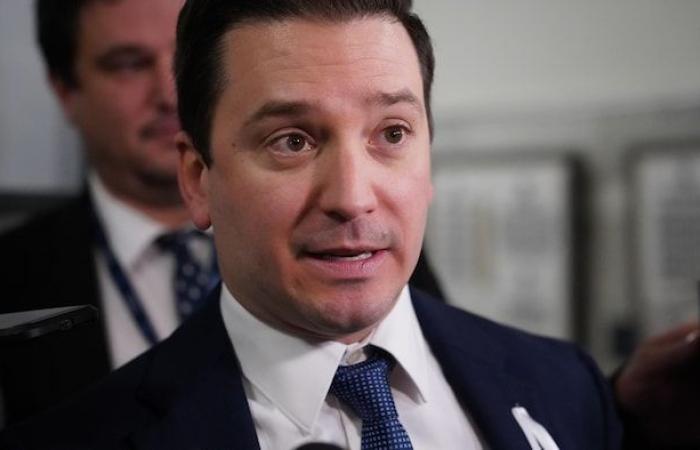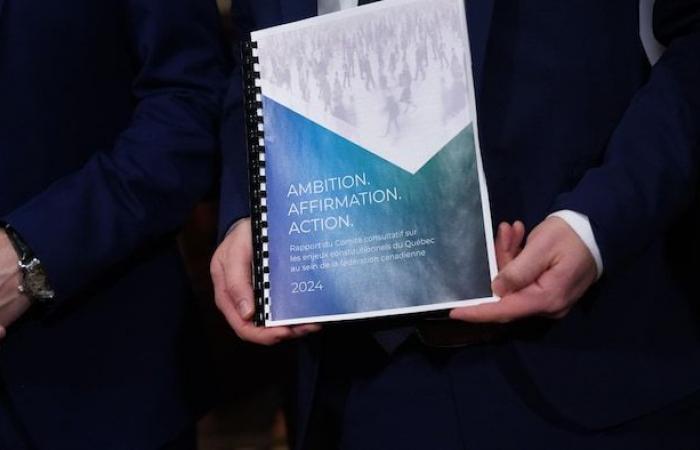The Proulx-Rousseau committee report is making its way into the offices of the CAQ government.
By going to the Salon rouge to attend question period on Wednesday morning, François Legault said to himself open
to present a draft Quebec constitution by the 2026 general elections.
This question is at the heart of the report of the Advisory Committee on the constitutional issues of Quebec in the Canadian federation, which was presented to the press on Tuesday. This is actually the first of its 42 recommendations.
By saying to yourself open
François Legault therefore takes a further step towards this idea, he who, the day before, had already declared that the committee’s recommendations aimed at strengthen the autonomy of Quebec
were welcome
, [y compris] the possibility of having a Quebec constitution
.
Asked about the follow-up to be given to the report, the minister responsible for the file, Simon Jolin-Barrette, did not want, on Wednesday, to commit to the idea of providing Quebec with a fundamental law by 2026, contenting himself with to say, like the day before, that he was going to take the time to study all the proposals.
However, he stressed that the advantages of adopting a Quebec constitution were explained very clearly
in the report of the committee, which was chaired by jurists Sébastien Proulx and Guillaume Rousseau.
The fundamental laws of Quebec could be enshrined there and there are other federated states in Canada which have a constitution
he stressed.
Open in full screen mode
The Advisory Committee on Constitutional Issues in Quebec in the Canadian Federation was placed under the responsibility of the Minister of Justice, Simon Jolin-Barrette.
Photo : - / Sylvain Roy Roussel
In an interview Wednesday on the Montreal show All one morningGuillaume Rousseau explained for his part that a constitution bringing together existing laws, such as the Charter of Human Rights and Freedoms, the Charter of the French Language and the Law on State Secularism, could be adopted as n any other law.
But if we want [les] modifier [ou] take advantage of it to [réformer] democratic institutions, [par exemple]there may be a need for wider consultation
he admitted.
Adopting a Quebec constitution, according to him, could also prevent the Quebec government from having to resort to the notwithstanding provision of the Canadian Constitution to protect its laws from the courts, maintains Guillaume Rousseau.
The Charter of the French Language, for example, is contested almost uninterrupted
since its adoption, he emphasizes. Just like the Law on State Secularism.
These two texts, at the start
were very controversial
et divided
Quebecers, but since then, time
did his work and an agreement
East being built
argues Guillaume Rousseau, according to whom we should not wait either unanimity
to move forward.
Sébastien Proulx, for his part, clarified in an interview with Midi info Wednesday thatit will be up to the government, the committees and the people it puts in place
to determine what should be included in the constitution if Quebec decides to act in this direction.
There are debates to be had
he admitted, but on our side, [nous] we came to the conclusion that these three laws
are essential
et are an integral part of what currently exists in Quebec
.
According to him, Quebec should stop considering itself as a state subordinate
in Canada, to the extent that the birth of the Quebec nation precedes that of the Canadian federation, in 1867.
The provinces
he said, are federal states that are equal in terms of responsibility [et] of skills, that is to say they do not have the same: some are shared, some are personalized, therefore autonomous to each of the States, but in reality, there is not this link of subordination .
The report co-signed by MM. Proulx and Rousseau – titled Ambition. Affirmation. Action. – suggests, in addition to the adoption of a Quebec constitution, the creation of a constitutional council and a parliamentary commission dedicated to constitutional or international affairs, in particular.
Some of these proposals could be applied unilaterally, such as the adoption of French as the official and common language of Quebec and the abolition of the obligatory oath to the king for deputies of the National Assembly, which were enshrined in the Canadian Constitution without the approval of Ottawa.
Other recommendations would require federal agreement, but not that of the other provinces.
Open in full screen mode
The Proulx-Rousseau committee report is 108 pages long. (Archive photo)
Photo : - / Sylvain Roy Roussel
François Legault announced with great fanfare the creation of the Proulx-Rousseau committee on the last day of the last parliamentary session, May 7, in order to face a worrying trend towards centralization and encroachment
of the federal government.
No less than 44 briefs were filed in the months that followed. Several of them also recommended giving Quebec its own constitution, an idea that the Liberal Party has also defended since last summer.
Questioned on the subject on Wednesday, the MP for Pontiac, André Fortin, however warned that the members of his party will have to be consulted before the caucus decides on the follow-up to be given to the report, including with regard to the possibility to have a fundamental law adopted by the National Assembly.
The Liberal Party is a party that has members, it is a party that has authorities, it is a party that has people who are very, very, very interested in these issues, he said. -he recalled. So, we will want to look at each of the proposals, but on the overall concept of a constitution, we are already there.
Supporters of the independence of Quebec, the PQ and solidarity deputies showed very little enthusiasm in relation to the recommendations of the Proulx-Rousseau committee, contenting themselves with saying on Wednesday that the proposals which will be retained by the Legault government will be evaluated on a case by case basis.







